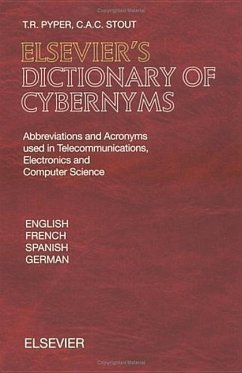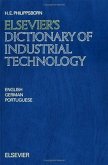This dictionary was produced in response to the rapidly increasing amount of quasi-industrial jargon in the field of information technology, compounded by the fact that these somewhat esoteric terms are often further reduced to acronyms and abbreviations that are seldom explained. Even when they are defined, individual interpretations continue to diverge.
Until now the codes have been reproduced in separate (language) publications: there is no universal listing in alphabetical order that covers the English, French, Spanish and German languages. This dictionary sets out the English, French, Spanish and German alternatives as a single, merge-sorted whole.
Today, most of the codes have passed into the public domain, simply because they exist in most of the telecommunications systems installed throughout the developed (and developing) world and are largely known to most of those who work in that particular area. However, foreign variants often defy even the most astute observer. This dictionary seeks to clarify this bewildering situation as much as possible. The 26,000 definitions set out here, drawn from some 16,000 individual cybernyms, cover computing, electronics, telecommunications (including intelligent networks and mobile telephony), together with satellite technology and Internet/Web terminology.
Annex I lists some of the innumerable file types found in the filing systems of computers using powerful desktop managers and Annex II lists the abbreviations of country names found in universal resource locators (URL).
Elsevier's Dictionary of Cybernyms is a useful tool for translators, students, universities and computer enthusiasts.
Hinweis: Dieser Artikel kann nur an eine deutsche Lieferadresse ausgeliefert werden.
Until now the codes have been reproduced in separate (language) publications: there is no universal listing in alphabetical order that covers the English, French, Spanish and German languages. This dictionary sets out the English, French, Spanish and German alternatives as a single, merge-sorted whole.
Today, most of the codes have passed into the public domain, simply because they exist in most of the telecommunications systems installed throughout the developed (and developing) world and are largely known to most of those who work in that particular area. However, foreign variants often defy even the most astute observer. This dictionary seeks to clarify this bewildering situation as much as possible. The 26,000 definitions set out here, drawn from some 16,000 individual cybernyms, cover computing, electronics, telecommunications (including intelligent networks and mobile telephony), together with satellite technology and Internet/Web terminology.
Annex I lists some of the innumerable file types found in the filing systems of computers using powerful desktop managers and Annex II lists the abbreviations of country names found in universal resource locators (URL).
Elsevier's Dictionary of Cybernyms is a useful tool for translators, students, universities and computer enthusiasts.
Hinweis: Dieser Artikel kann nur an eine deutsche Lieferadresse ausgeliefert werden.
"...the dictionary is astonishingly comprehensive, being particularly good on computer programs and telecommunications. ...many organisations are included." --International Journal for Language and Documentation"...Elsevier's Dictionary of Cybernyms is a useful tool for translators, students, universities, and computer enthusiasts." --Translatio XIX, No. 3, 2000"...this book should be in every translation library. But it is also valuable for other contents, and should also be in every public library. We have several reasons to be grateful to the compilers of this eminently useful volume. The book has two appendices which in general library use will be widely consulted." --Terminologie Traduction"...This Dictionary contains a lot of useful abbreviations and acronyms, some of which you may not find anywhere else or only with some difficulty. ...A definite reference dictionary for those working into English; quite interesting for the others." --Bulletin of the Institute of Translation and Interpreting








